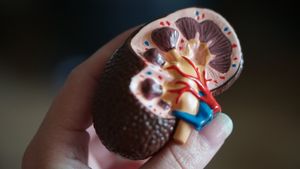YOGYAKARTA Delicious or not food, depending on how the sense of taste works. If you experience disturbances, the taste of any sophisticated food will be meaningless. As experienced by people with dysgeusia. Dysgeusia is an abnormality that disturbs the sense of taste. People with this condition, taste all foods only with a limited taste, such as sweet, acid, bitter, or bitter.
Regarding taste disorders, dysgeusia is different from anosmia and ageusia. Anosmia is characterized by the loss of part or all of the smell which is a symptom of COVID-19, although it can also be experienced due to a number of other health problems. Ages, referring to the total loss of taste. To recognize dysgeusia is more specific, here's the full explanation.
In general, a person experiences dysgemia due to side effects from certain treatments or treatments. It can also be caused by lack of vitamins or minerals. Pregnant women can also experience flavor changes. However, in rare cases, dysgeusia can be a symptom of liver disease, hypothyroidism, or other health conditions.
According to research, as many as 17 percent of adults in the United States experience dysgeusia at a time. Launching the Cleveland Clinic, Friday, October 20, dysgeusia causes a bad feeling in the mouth even though it is not eating anything. Symptoms of dysgeusia, among others as follows:
That's the picture of dysgesia symptoms. Below, describe any factors that cause dysgeusia.
The most common cause of dysgeusia is due to loss of sense of smell. This is experienced, one of which is due to COVID-19 infection. In addition, it can also be caused by the following factors
People who have bacterial, viral, or fungal infections in the gums, mouth, or throat may experience swelling. This swelling can cause blood flow to decrease to the sense of taste so as to change your sense of taste.
Some drugs can affect your sense of taste. These include amoxyllin, metronidezol, diuretic, calcium channel inhibition, and some blood pressure drugs such as kappacryl. Changes in taste are also the main side effects of chemotherapy and radiation therapy, especially when treating cancer.
There are many factors that can cause the mouth to dry out. Including some drugs, Sjogren syndrome, or radiation therapy for cancer. Without sufficient saliva production, your taste receptor may not be stimulated.
Lack of vitamins and minerals is one of the causes of dysgeusia. Especially when a person experiences a lack of zinc or vitamin B. This condition is prone to the loss of tasteability.
VOIR éGALEMENT:
Refluxes of chronic acid, or GERD, occur when stomach acid enters the mouth. This can affect the function of taste. Therefore, some GERD sufferers experience dysgeusia.
A neurological disorder in people with Alzheimer's disease, Parkinson's disease, and multiple sclerosis (MS) has been associated with dysgeusia. In addition, some nerves are responsible for taste sensations. If these nerves are damaged, it can cause dysgeusia, especially nerve damage related to the ears, neck, and Bell's palms.
Metabolic disorders experienced by people with diabetes, hypothyroidism, kidney disease, and others are associated with dysgeusia. Because metabolism does not work normally, the sense of taste also cannot taste food appropriately.
In addition to the seven causes of dysgesia above, dental protests, pregnancy, smokers, and aging also affect the way taste receptors work in the sense of taste.
The English, Chinese, Japanese, Arabic, and French versions are automatically generated by the AI. So there may still be inaccuracies in translating, please always see Indonesian as our main language. (system supported by DigitalSiber.id)














